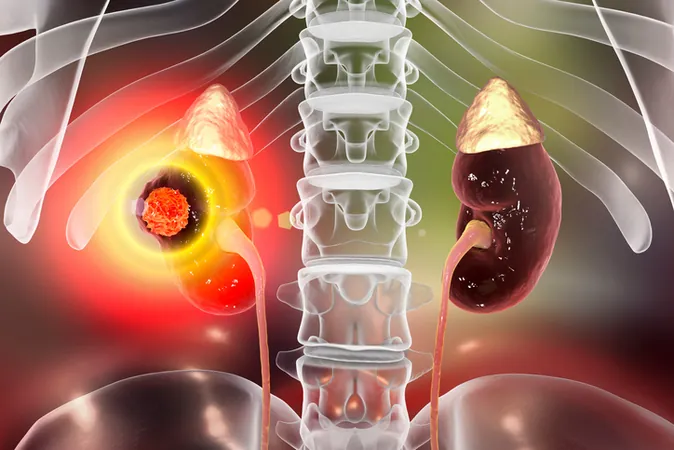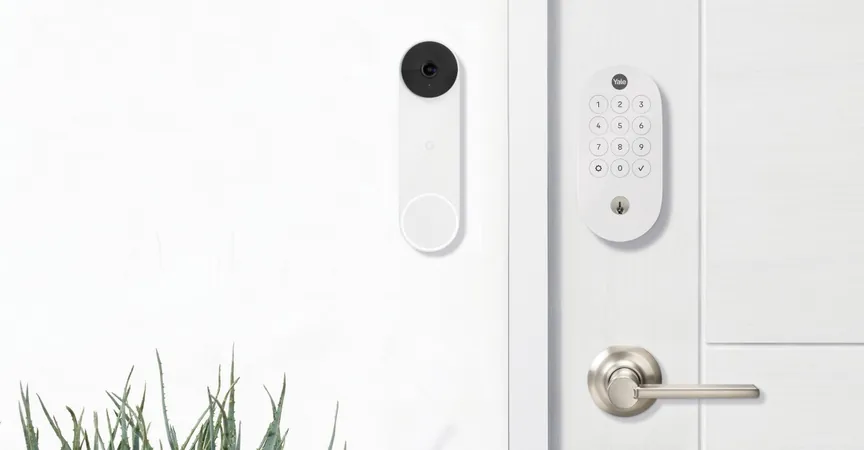
Breakthrough Urine Test Could Revolutionize Kidney Cancer Monitoring!
2025-03-26
Author: Jacob
In an exciting development in the fight against kidney cancer, a new urine-based biomarker test known as the GAGome score has shown promise for the early detection of cancer recurrence, potentially transforming patient care. The findings emerged from the AURORAX-0087A trial, presented at the prestigious European Association of Urology (EAU) Congress held in Madrid.
The GAGome score measures glycosaminoglycans (GAGs) found in urine samples. GAGs are long, unbranched polysaccharides essential in maintaining cell signaling and influencing tumor microenvironment integrity. By assessing the unique profiles of these molecules, researchers believe the GAGome score can serve as an effective monitoring tool for minimal residual disease in patients diagnosed with clear cell renal cell carcinoma (ccRCC).
Lead researcher Dr. Saeed Dabestani, an associate professor at Lund University and a member of the European Association of Urology’s kidney cancer guidelines panel, emphasized the significance of developing robust tests for guiding clinical practice. “It is crucial for any diagnostic test to be prospectively developed and validated before being incorporated into major clinical guidelines,” he stated.
The Revolutionary GAGome Score
This study is a two-phase endeavor, with the initial phase focusing on calibrating the GAGome score among 134 patients. These patients were treated across 23 hospitals in the U.K., EU, U.S., and Canada. All subjects were diagnosed with localized ccRCC and had undergone surgery, primarily nephrectomy (total kidney removal). They received CT scans alongside urine tests every three months to analyze their GAG levels using mass spectrometry. A score above 12 on the GAGome test indicates a positive result, potentially alerting healthcare providers to the need for further examination.
The results from the first phase of the trial unveiled high sensitivity but moderate specificity. The GAGome test demonstrated a sensitivity of 90% for detecting recurrence but a specificity of just 51%. More crucially, the negative predictive value stood at an impressive 97%. This means that if the GAGome score is negative, it strongly indicates that the patient does not have a recurrence, potentially allowing them to avoid unnecessary imaging and reduce healthcare costs.
Addressing 'Scanxiety' and Overtreatment
Approximately 20% of ccRCC patients experience a recurrence within five years following surgery, mostly within the first two years. Currently, these patients are subjected to regular imaging scans—often CT scans—every 6 to 12 months, creating challenges around "scanxiety," a term that highlights patients' anxiety regarding their frequent scans.
Dr. Dabestani highlighted a troubling trend: some patients may undergo twice as many scans as medically recommended. He hopes the GAGome test can lead to a more tailored follow-up strategy. “If a patient has a negative GAGome score, they may not need immediate imaging, thus minimizing unnecessary radiation exposure and alleviating anxiety,” he remarked.
Looking Ahead: Validation and Regulatory Approval
The ongoing second phase of the AURORAX-0087 trial is set to conclude by April 2025 and aims to validate the results in a new cohort of patients, ensuring the GAGome score's efficacy.
The discovery of the GAGome's potential represents a significant step toward integrating non-invasive biomarkers into cancer monitoring strategies. Dr. Dabestani pointed out, “As of now, GAGome profiling is not used clinically for any cancer. However, this research could herald a new era of diagnostic tools that not only enhance patient care but also optimize healthcare resources.
If further validation and regulatory approval are achieved, the GAGome test could dramatically alter kidney cancer management—offering a less invasive, cost-effective, and reliable means to detect recurrences, ultimately improving outcomes for countless patients battling this formidable disease. Stay tuned as we watch this groundbreaking research unfold!









 Brasil (PT)
Brasil (PT)
 Canada (EN)
Canada (EN)
 Chile (ES)
Chile (ES)
 Česko (CS)
Česko (CS)
 대한민국 (KO)
대한민국 (KO)
 España (ES)
España (ES)
 France (FR)
France (FR)
 Hong Kong (EN)
Hong Kong (EN)
 Italia (IT)
Italia (IT)
 日本 (JA)
日本 (JA)
 Magyarország (HU)
Magyarország (HU)
 Norge (NO)
Norge (NO)
 Polska (PL)
Polska (PL)
 Schweiz (DE)
Schweiz (DE)
 Singapore (EN)
Singapore (EN)
 Sverige (SV)
Sverige (SV)
 Suomi (FI)
Suomi (FI)
 Türkiye (TR)
Türkiye (TR)
 الإمارات العربية المتحدة (AR)
الإمارات العربية المتحدة (AR)